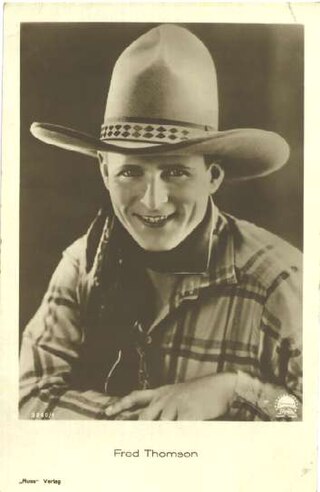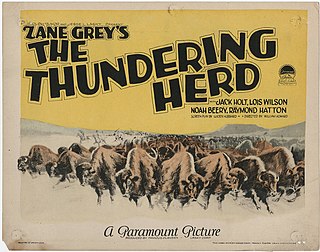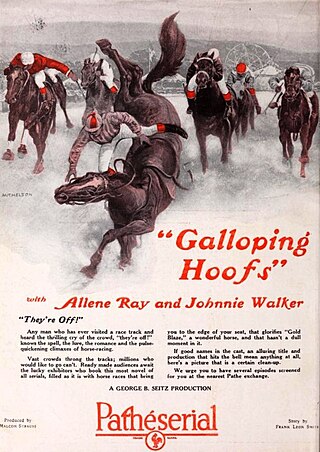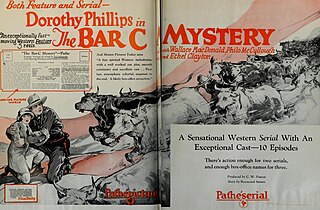Thundering Hoofs may refer to:
- Thundering Hoofs (1922 film), an American silent drama film
- Thundering Hoofs (1924 film), an American silent Western film
- Thundering Hoofs (1942 film), an American Western film
Thundering Hoofs may refer to:

William Lowery was an American silent film actor. He was born in St. Louis, Missouri, and was signed by the Thanhouser Company in 1914.

Frederick Clifton Thomson was an American silent film cowboy who rivaled Tom Mix in popularity before dying at age 38 of tetanus.
Thundering Herd or Thundering herd may refer to:

The Thundering Herd is a 1925 American silent Western film, now lost. It is directed by William K. Howard and starring Jack Holt, Lois Wilson, Noah Beery, Sr. and Raymond Hatton. Based on Zane Grey's 1925 novel of the same name and written by Lucien Hubbard, the film is about a trader who uncovers a scheme to blame the Indians for a buffalo-herd massacre. It was one of a series of critically and commercially successful Zane Grey westerns produced by Jesse Lasky and Adolph Zukor for Paramount Pictures.

Albert S. Rogell was an American film director who was born in Oklahoma City and died in Los Angeles. Rogell directed more than a hundred movies between 1921 and 1958. He was known for an aggressive directing style, shouting at his actors and crew.

The Miracle Rider is a 1935 American Western film serial directed by B. Reeves Eason and Armand Schaefer for Mascot. It stars silent movie cowboy star Tom Mix in his last major film role.

Custer's Last Stand is a 1936 American film serial based on the historical Custer's Last Stand at the Little Bighorn River. It was directed by Elmer Clifton, and starred Rex Lease, William Farnum and Jack Mulhall. It was produced by the Poverty Row studio Stage & Screen Productions, which went bust shortly afterwards as a victim of the Great Depression. This serial stars many famous and popular B-Western actors as well as silent serial star Helen Gibson playing Calamity Jane, Frank McGlynn Jr. as General Custer, and Allen Greer as Wild Bill Hickok.

The Ghost City is a 1923 American silent Western film serial directed by Jay Marchant. It is considered to be a lost film.

The Ace of Spades is a 1925 American silent Western film serial directed by Henry MacRae. The serial is considered to be a lost film.
Frank Birney Ellis was an American actor in silent and sound films and serials. He appeared in more than 480 films between 1917 and 1954. He was born in Oklahoma and died in Los Angeles, California. He appeared as a townsman in uncredited roles in the TV Western series Gunsmoke – S7E27's ”Wagon Girls” (1962); and S9E8's “Carter Caper” (1963).

Galloping Hoofs is a 1924 American silent Western film serial directed by George B. Seitz and starring Allene Ray and Johnnie Walker. The film is now considered to be lost.

The Bar C Mystery is a 1926 American silent Western film serial directed by Robert F. Hill. It is now considered to be lost.

Riders of the Plains is a 1924 American silent Western film serial directed by Jacques Jaccard for Arrow Films. It was co-written by Karl R. Coolidge and Jacques Jaccard.

Philip John Ford was an American film director and actor. He directed more than 40 films between 1945 and 1964. He also appeared 16 in films between 1916 and 1926. He was the son of actor/director Francis Ford and the nephew of director John Ford. He was born with the family name Feeney in Portland, Maine, and only later took on the family name of "Ford" after his father and uncle had. He died in Los Angeles, California.

Thundering Hoofs is a 1942 American Western film directed by Lesley Selander and starring Tim Holt. It was the first of many films Holt made with Selander.
Marion Jackson was an American screenwriter of the late silent and early sound film eras. During her 15-year career she would pen the scripts for over 40 films, both original and adaptations.
Sam Nelson (1896–1963) was an American film director who worked from the end of the silent era through the early 1960s. While most of his film work was in the assistant director role, he did direct over twenty films during the 1930s and 1940s, all of which were Westerns. As an assistant director, he worked on such productions as Pennies from Heaven, And Then There Were None, All the King's Men, the original 3:10 to Yuma, Some Like It Hot, A Raisin in the Sun, and Spartacus. In addition, he appeared in over a dozen films in small acting roles.

Thundering Hoofs is a 1924 American silent Western film directed by Albert S. Rogell and starring Fred Thomson, Ann May, and William Lowery.
Thundering Hoofs is a 1922 American silent drama film directed by Francis Ford and starring Ford, Peggy O'Day and James T. Kelley. Made as an independent, it was directed by Francis Ford who was the elder brother of the better-known John Ford. Copies of the film still survive, unlike many independent productions of the era.

Thundering Romance is a 1924 American silent Western film directed by Richard Thorpe and starring Jay Wilsey, Jean Arthur and Harry Todd.